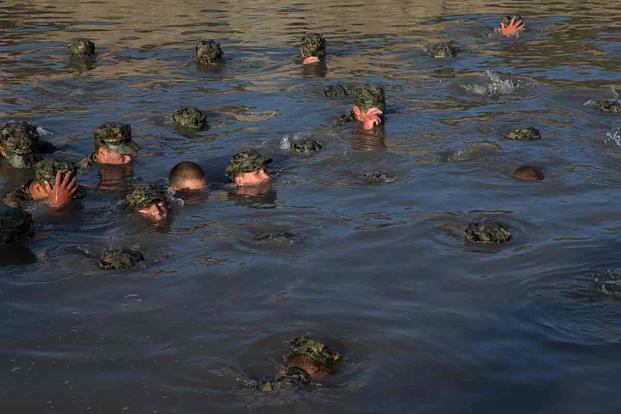More than two years after the death of recruit Kyle Mullen during the grueling Hell Week portion of Navy SEAL training, the Defense Department’s watchdog says the service has made some changes to improve medical care and safety in the program but that more changes are needed.
The DoD inspector general report released Thursday found that the Navy “lacks a policy on the intentional use of sleep deprivation practices” and should beef up the number of medical professionals it has on staff to help with the demand placed on the medical department during Hell Week.
The Navy determined that Mullen died of acute pneumonia shortly after completing Hell Week on Feb. 4, 2022. An investigation into his death, however, also found evidence that SEAL recruits are not given adequate care and the BUD/s course, the official name for the elite training program, had fostered a culture in which seeking help in emergency situations was all but prohibited.
Read Next: Military Detains Person of Interest in Suspected Homicide of Sergeant at Fort Leonard Wood
One new concern that IG investigators found was over the number of doctors that the Navy’s Special Warfare Command actually employed.
They recommended that the service “reassess” its medical capabilities and, “at a minimum,” determine whether they are able to provide the appropriate standard of care for candidates and that staffing meets “clinical demand.”
A senior official from the command’s medical department told investigators that they need “additional corpsmen to mitigate the staff’s potential for burnout, as well as specialized medical equipment to improve the health and safety of Navy SEAL candidates.”
The report also encouraged the Navy to better codify how it uses sleep deprivation as part of the training.
While the report concedes that the practice is “operationally relevant” and there are safety procedures in place to mitigate the risk to candidates, its application is mostly based on tradition and some science that dates back to the 1980s.
Investigators found that, while Navy officials told them “that sleep deprivation has been part of Hell Week training curriculum since its inception,” they “were unable to provide specific rationale for the timing, length, or number of sleep periods candidates receive in Hell Week.”
Meanwhile, in August, Navy officials told Military.com that since the service’s investigations into Mullen’s death and the culture at the SEAL schoolhouse, they have made some significant policy changes to prevent another death, including 14 changes to BUD/s that range from prophylactic antibiotics to prevent pneumonia to more robust health screenings for Hell Week.
The investigation found that many of these changes have, indeed, been put into place.
After Mullen’s death, investigators also found a stash of performance-enhancing drugs in his car, including testosterone and human growth hormone, and text messages on his phone that included a conversation in which he discussed using a bad vial of drugs that left swelling at an injection site.
However, that same investigation failed to definitively conclude that Mullen used the drugs, noting that neither his blood nor urine was able to be tested.
Included among the changes was the Navy’s announcement that it would start to regularly test SEALs for performance-enhancing drugs.
The investigation noted that those tests are now ongoing and between March 2023 and January 2024, “of the 1,817 candidates [the Navy] tested for PEDs, three SEAL and three [combat craft crewmen] candidates had confirmed positive urinalysis tests.”
However, they also noted that “the DoD drug testing policy related to PEDs needs review and revision”– namely because it “does not define PEDs or state whether steroids are considered PEDs.”
Following Mullen’s death, the Navy also took action against three top officers who were in charge at the time.
In September 2023, the Navy confirmed that Capt. Brian Drechsler, Capt. Bradley Geary and Cmdr. Erik Ramey all received nonpunitive letters of reprimand and leaders were planning to take the three men to admiral’s mast — a nonjudicial form of punishment — over their roles in the death.
Rolling Stone also reported that a fourth person, to whom the Navy hoped to issue a disciplinary letter, was the medical duty officer the night Mullen died.
Geary was in charge of the Basic Training Command, which ran BUD/s, and Ramey was the command’s top medical official. Drechsler oversaw them both as the Naval Special Warfare Center’s commanding officer.
However, it’s not clear how much impact the Navy’s actions had.
In June, Drechsler announced his honorable retirement from the service in a social media post. The medical duty officer has also since retired.
Geary refused the mast and seems to be heading to a Board of Inquiry instead. That is a more formal proceeding than an admiral’s mast but not as serious as a court-martial. He’s also fighting his case in public and trying to gather support from lawmakers.
In an interview with Military.com, Geary largely defended the BUD/s process, saying that the arduous, if not brutal, training regimen is necessary to produce the kinds of sailors who can survive and win on the battlefield.
“We have refined the idea of what it means to be a warfighter, and we’ve been very, very successful,” Geary said in August.
However, he did concede that the SEALs have made mistakes and “we’re not perfect.”
Related: Navy SEAL Commander Who Oversaw Training During Mullen Death Faults Drugs, Not Leadership
Story Continues
Read the full article here

